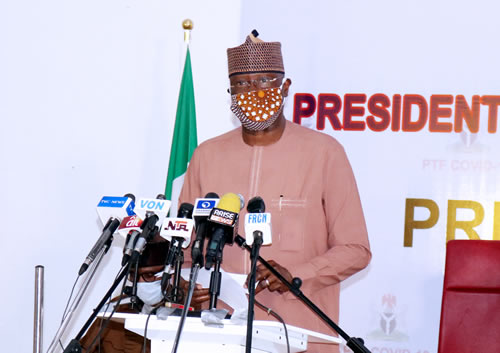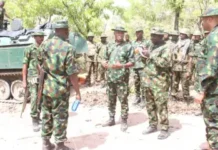The federal government has lifted restrictions on worship places in the country.
Boss Mustapha, Chairman of the Presidential Task Force on COVID-19 made this disclosure on Monday in a Press briefing in Abuja.
The new directive is coming months after the ban on churches and mosques were enabled.
Some states have since opened their religious centres. The federal government however said the reopening of worship centres is still largely based on following the protocols of the federal government and the NCDC.
“After considering all factors mentioned above, the PTF submitted its recommendations and the PRESIDENT has approved the following for implementation over the next four weeks spanning 2nd – 29th June, 2020, subject to review-:
i. Cautious advance into the Second Phase of the national response to COVID-19;
ii. Application of science and data to guide the targeting of areas of on-going high transmission of COVID-19 in the country;
iii. Mobilisation of all resources at State and Local Government levels to create public awareness on COVID 19 and improve compliance with non-pharmaceutical interventions within communities;
iv. Sustenance of key non-pharmaceutical interventions that would apply nationwide and include:
-Ban of gatherings of more than 20 people outside of a workplace;
–Relaxation of restriction on places of Worship based on guidelines issued by the PTF and Protocols agreed by State Governments
Secretary to the Government of the Federation, Boss Mustapha
-Managed access to markets and locations of economic activity to limit the risk of transmission;
– Ban on inter-state travels except for movement of agricultural produce, petroleum products, manufactured goods and essential services;
– Mandatory use of non-medical face masks in public places;
– Mandatory provision of handwashing facilities/sanitisers in all public places;
– Extensive temperature checks in public places;
– Maintaining 2 metres between people in public places;
– Strengthening infection prevention and control at healthcare facilities;
– Isolation of vulnerable populations (elderly and those with underlying health conditions)
– Massive information and education campaigns.
v. Deepening of collaborative efforts with the community leaders, civil society, faith-based organisations, traditional institutions, etc;
vi. Continuous mobilisation of State governments to take up greater role in the implementation of the guidelines and advisories provided by the PTF;
vii. Continued provision of support by the NCDC to States through guidelines to shape decision-making in responding to high burden LGAs and Wards; and
viii. Easing the total lockdown of Kano State and introduction of Phase One of the Eased Lockdown


























